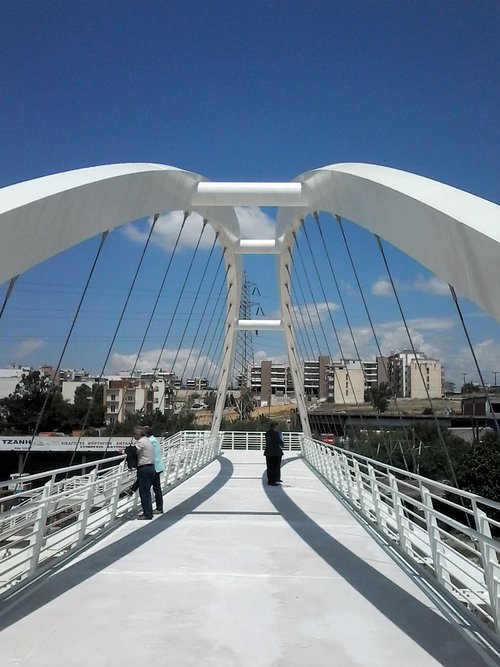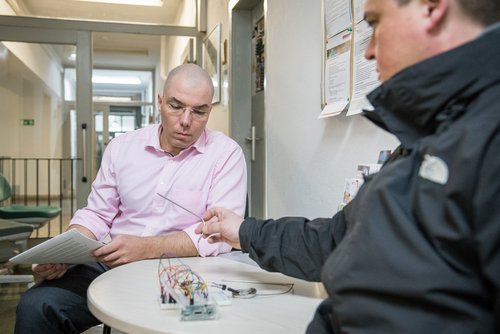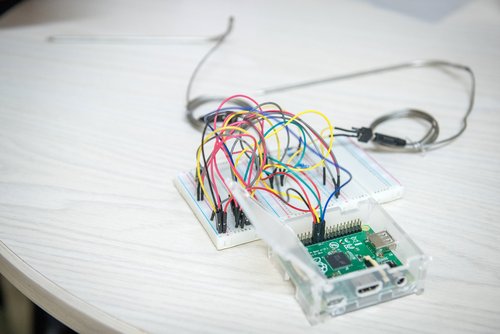Artificial Intelligence in Civil Engineering: German Research Foundation (DFG) Supports the Initiation of International Collaboration between Weimar and Thessaloniki
Explainable Artificial Intelligence (XAI) is employed for solving problems in civil engineering more transparently than traditional Artificial Intelligence, while being equally efficient. An international team of researchers from Bauhaus University Weimar and Aristotle University of Thessaloniki is investigating the potential of XAI for problem solving in civil engineering by studying the dynamic behavior of slender structures.
In a joint research project, Professor Dr. Kay Smarsly, Chair of Computing in Civil Engineering at Bauhaus University Weimar, and Professor Dr. George D. Manolis, Laboratory of Experimental Strength of Materials and Structures at Aristotle University of Thessaloniki, investigate how XAI systems can systematically increase the safety of slender structures, such as bridges and towers. »Condition assessment of structures typically has been based on decades-long accumulated experience of civil engineers. In addition, large amounts of sensor data are being recorded from structures nowadays. Using the XAI approach, anomalies in the sensor data, such as unusual deformations, are expected to be detected quickly and reliably. Unlike common Artificial Intelligence approaches, the XAI approach produces results that are transparent and easily understood by engineers. Safety issues of slender structures can be detected and remedial measures can be adopted in a timely manner«, Professor Smarsly explains.
The XAI approach will be validated through field tests on a pedestrian bridge in Thessaloniki. Sensor data will be recorded by intelligent, self-learning sensor nodes to analyze the structural condition of the bridge. Features relevant to the structural condition, such as patterns in acceleration response and temperature fluctuations, will be extracted by the sensor nodes based on machine learning techniques being part of the XAI approach. Patterns indicating abnormal structural conditions will be detected automatically. »The more sensor data is collected the more reliable the results are, thus enabling the XAI system to efficiently learn from the sensor data«, Professor Manolis adds.
XAI: Artificial Intelligence to be more transparent and, thus, more accepted by engineers
Artificial intelligence has arrived in our everyday lives, and the researchers are convinced it will change civil engineering practice: »The possibilities of digitalization, automation, and machine learning in civil engineering are manifold. Nevertheless, engineers often have aversions to AI and do not trust it because of its non-transparent models«, Professor Smarsly says. This research project therefore aims to make the complex AI-based data processing and data analysis algorithms more transparent, thus increasing the acceptance of artificial intelligence in civil engineering practice.
Project:
Data-driven analysis models for structures using explainable artificial intelligence, project duration: 2019 to 2020, further information: www.uni-weimar.de/cce/research/research-projects-since-2013/explainable-artificial-intelligence/
Funding source:
German Research Foundation (DFG): Initiation of International Collaboration
Collaboration partners:
Bauhaus-Universität Weimar
Faculty of Civil Engineering
Prof. Dr.-Ing. Kay Smarsly, Computing in Civil Engineering
Aristotle University Thessaloniki
Department of Civil Engineering
Prof. Dr. George D. Manolis, Division of Structures
Contact:
For further information, please contact Professor Dr. Kay Smarsly, Bauhaus-Universität Weimar,
Faculty of Civil Engineering, Computing in Civil Engineering, by phone (+49 3643 58 4214) or by email (kay.smarsly[at]uni-weimar.de).
* This text was translated by Prof. Dr. Kay Smarsly



